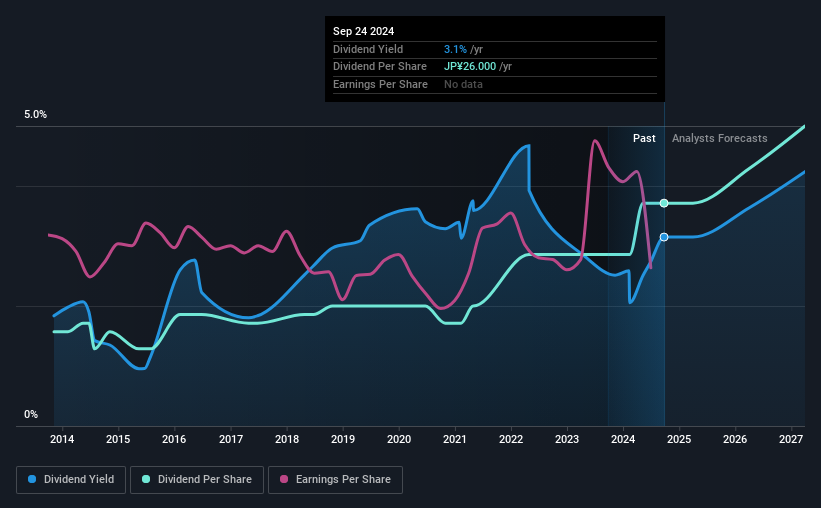The Hachijuni Bank, Ltd.'s (TSE:8359) investors are due to receive a payment of ¥13.00 per share on 9th of December. This makes the dividend yield about the same as the industry average at 3.1%.
See our latest analysis for Hachijuni Bank
Hachijuni Bank's Earnings Will Easily Cover The Distributions
Unless the payments are sustainable, the dividend yield doesn't mean too much.
Having distributed dividends for at least 10 years, Hachijuni Bank has a long history of paying out a part of its earnings to shareholders. Based on Hachijuni Bank's last earnings report, the payout ratio is at a decent 51%, meaning that the company is able to pay out its dividend with a bit of room to spare.
Looking forward, earnings per share is forecast to rise by 15.9% over the next year. If the dividend continues on this path, the future payout ratio could be 51% by next year, which we think can be pretty sustainable going forward.

Dividend Volatility
Although the company has a long dividend history, it has been cut at least once in the last 10 years. The annual payment during the last 10 years was ¥11.00 in 2014, and the most recent fiscal year payment was ¥26.00. This works out to be a compound annual growth rate (CAGR) of approximately 9.0% a year over that time. We have seen cuts in the past, so while the growth looks promising we would be a little bit cautious about its track record.
Dividend Growth May Be Hard To Achieve
With a relatively unstable dividend, it's even more important to evaluate if earnings per share is growing, which could point to a growing dividend in the future. Although it's important to note that Hachijuni Bank's earnings per share has basically not grown from where it was five years ago, which could erode the purchasing power of the dividend over time. The company has been growing at a pretty soft 1.1% per annum, and is paying out quite a lot of its earnings to shareholders. This isn't necessarily bad, but we wouldn't expect rapid dividend growth in the future.
Our Thoughts On Hachijuni Bank's Dividend
Overall, it's great to see the dividend being raised and that it is still in a sustainable range. The payout ratio looks good, but unfortunately the company's dividend track record isn't stellar. Taking all of this into consideration, the dividend looks viable moving forward, but investors should be mindful that the company has pushed the boundaries of sustainability in the past and may do so again.
It's important to note that companies having a consistent dividend policy will generate greater investor confidence than those having an erratic one. Still, investors need to consider a host of other factors, apart from dividend payments, when analysing a company. For instance, we've picked out 2 warning signs for Hachijuni Bank that investors should take into consideration. Is Hachijuni Bank not quite the opportunity you were looking for? Why not check out our selection of top dividend stocks.
Valuation is complex, but we're here to simplify it.
Discover if Hachijuni Bank might be undervalued or overvalued with our detailed analysis, featuring fair value estimates, potential risks, dividends, insider trades, and its financial condition.
Access Free AnalysisHave feedback on this article? Concerned about the content? Get in touch with us directly. Alternatively, email editorial-team (at) simplywallst.com.
This article by Simply Wall St is general in nature. We provide commentary based on historical data and analyst forecasts only using an unbiased methodology and our articles are not intended to be financial advice. It does not constitute a recommendation to buy or sell any stock, and does not take account of your objectives, or your financial situation. We aim to bring you long-term focused analysis driven by fundamental data. Note that our analysis may not factor in the latest price-sensitive company announcements or qualitative material. Simply Wall St has no position in any stocks mentioned.
About TSE:8359
Hachijuni Bank
Provides various banking products and services to individuals, corporations, and sole proprietors.
Solid track record with adequate balance sheet.
Similar Companies
Market Insights
Community Narratives



